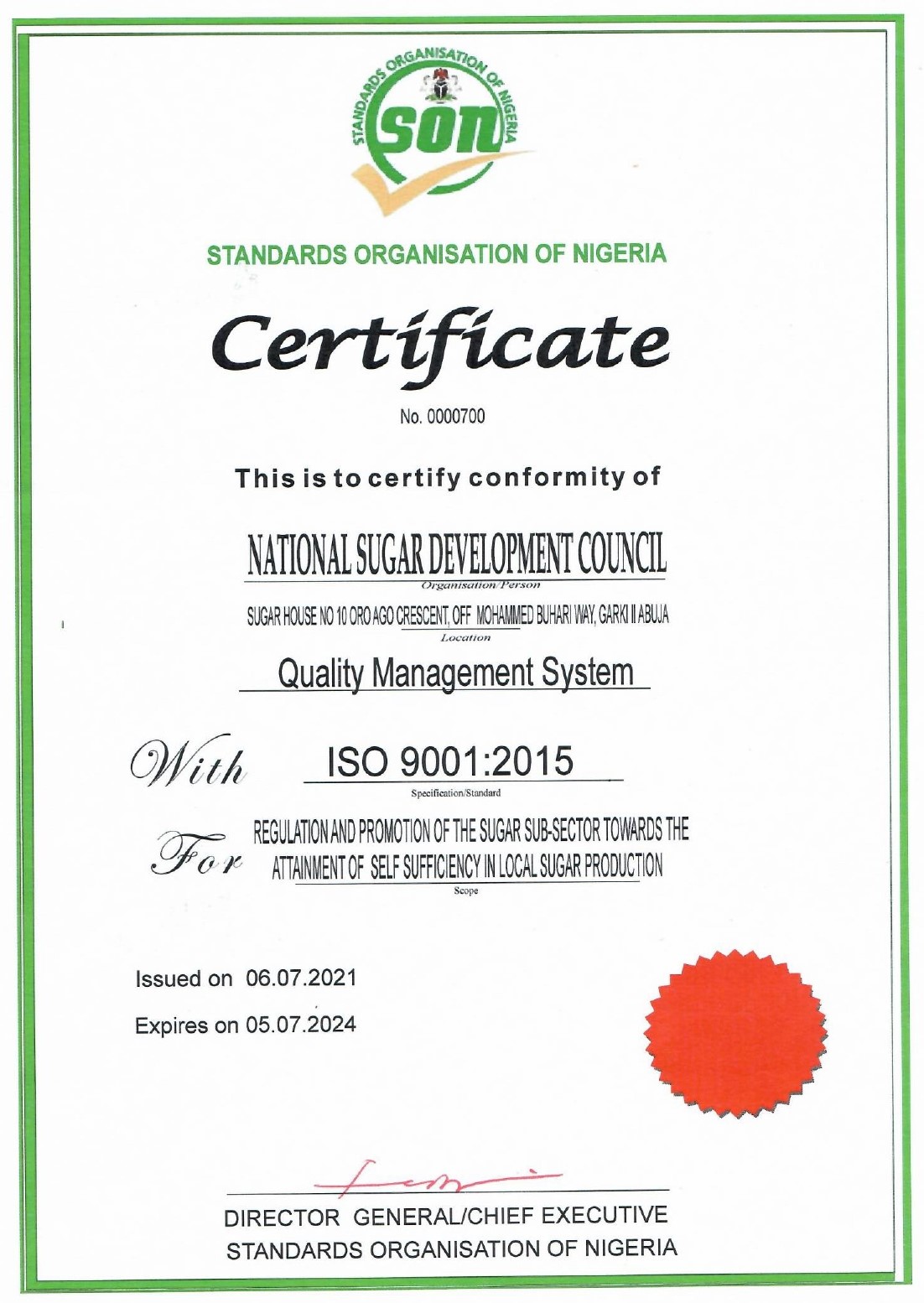The National Sugar Development Council (NSDC) was established by Decree 88 of 1993, now an Act of the National Assembly, Act Cap. No. 78 LFN of 2004, Amended in 2015,to catalyze the development of the sugar industry with a view to ensuring that Nigeria attains at least, 70% self-sufficiency in her sugar requirement within the shortest possible time and even export to earn foreign exchange. The Council therefore serves as the main focal agency responsible for the regulation of all activities in the sugar sub-sector ranging from production, marketing, importation and enforcement of relevant industry standards in collaboration with relevant government agencies.
The NSDC Act was amended in 2015 to capture and provide legal backing to some of the provisions of the Nigeria Sugar Master Plan (NSMP). The NSDC (Amended) Act 2015 has been gazette and captured in the Federal Republic of Nigeria Official Gazette Vol. 102 No. 68 of 12th June, 2015.
The establishment of NSDC was informed by the realization of the ineffective and un-coordinated planning and supervision of the sugar sub sector due to absence of a body/agency that could coordinate and monitor sugar development in Nigeria, to enable it contribute to the nation’s industrial and economic development.
The demand for sugar in Nigeria was estimated to have grown from 442,867 metric tonnes from 1995 to about 1,301,494 metric tonnes in 2005 showing an average annual growth rate of 7% while local production accounted for less than 2%, Today demand has risen to about 1.5mmt while local production has stagnated. This underdeveloped state of the sugar industry and the low local sugar production has deprived the country of all the benefits derivable from a vibrant sugar sector leaving some unwanted consequences notably, the annual drain on the nation’s foreign exchange earnings, loss of hundreds of thousands of employment opportunities and food insecurity arising from sugar import dependence.
Given the strategic importance of sugar, it became imperative that the nation’s precarious dependence on sugar be checked particularly since Nigeria has the potentials to become a net exporter of the commodity, if the capacity of the existing sugar plants is enhanced, new plants established and sugarcane out grower farmers encouraged and supported through provision of credit facilities, procurement of necessary inputs and development of basic infrastructure.
In realization of this fact, the National Sugar Development Council (NSDC) developed a road map called the Nigeria Sugar Master Plan (NSMP) for the attainment of self-sufficiency in sugar within 10 years. The NSMP was approved by the Federal Government in September, 2012 and its implementation commenced on 1st January, 2013.
The approval of the NSMP by Government and its adoption as the strategic road map for the development of the sugar sector was a clear demonstration of government’s commitment to leveraging on agriculture and industrial manufacturing to diversify the Nation’s economy and revenue sources in addition to creating employment opportunities for its citizens.
The Organization:
The National Sugar Development Council is a parastatal of the Federal Ministry of Industry, Trade and Investment and has an autonomous Management headed by the Executive Secretary who is also assisted by five (5) Directors heading various departments. The Executive Secretary serves as the Secretary/Member of a Governing Board which have representatives of relevant MDA’s, sugar producers, importers and Manufacturers Association of Nigeria (MAN) etc as members. The Executive Secretary reports also to the Honourable Minister of Industry, Trade and Investment through the Governing Board.
NSDC’s Mandate:
The mandate of the Council amongst others includes:
- To articulate policies and programmes that will bring about rapid development of the sugar sector;
- To progressively reduce level of sugar importation by increasing local production so as to achieve self-sufficiency;
- To encourage greater private sector participation in sugar production while reducing direct government involvement;
- To popularize sugar processing technologies as a means of generating employment for skilled and unskilled labour;
- To provide an effective and efficient R and D Support that will catalyze developments in the sugar sector.
Vision:
To make Nigeria a notable player in the global sugar trade through policies and strategies that will transform the local sugar industry into viable and efficient world-class industry.
Mission:
To accelerate the development and growth of the local sugar industry to achieve national self-sufficiency.
NSDC Core Values
The Council has also articulated a set of ideals and Core Values to serve as its organizational driving force towards the attainment of its overall goal. The Core Values are encapsulated in the acronym RIDER which stands for:
- R = Respect
- I = Integrity
- D = Discipline
- E = Excellence
- R = Reliability

